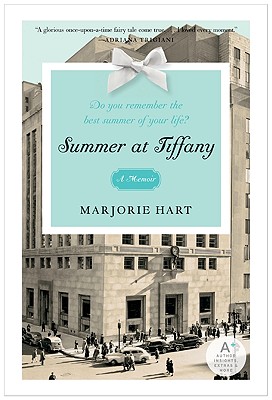In today's guest post, Marjorie Hart author of SUMMER AT TIFFANY, tells the amazing story of her second chapter. I'm inspired. Enough said.
 The Second Chapter
The Second Chapter
"What inspired you to write your Tiffany story?" is a key question that I have been asked at each of my book events. What I think they really mean is, "Why did a little old lady like you finally decide to write?"
It's no secret. I'm a debut writer who also happens to be an octogenarian. My book went on sale in hardcover just two weeks before my 83rd birthday and in trade paperback two weeks before I turned 86, so it’s a fair question.
Before I started writing, I was always skeptical of young writers who'd muse in print about how wonderful it would be to be old with all the free time in the world to pursue a new hobby and begin a second chapter in your life. I always reacted by thinking, “Really?” Because it's not wonderful to be old, there are never enough hours in the day for the first chapter, let alone beginning a second. My priorities following my retirement had been clear: keep up with family and play my cello with chamber music friends.
But when my grandchildren asked, "When are you going to write your Tiffany story?", I was flattered and promised I would. Easy, I thought—a few minutes a day. A nearby college offered an adult class in creative writing, so I signed up, mumbling, "I can't believe I'm doing this with seniors."
There we were, two rows of us. A young instructor explained the syllabus—we would critique each other's writing each week and then be tasked to revise our work based on those conversations. During the coffee break on the first night of class, a tall, gray-haired guy asked what I was writing. When I told him, he smiled. "Sounds fun—love that time when we were twenty-one. My name is Bob."
Bob wrote amazing poetry and I wondered why he needed the class. The day he read: "Each day she goes away a little—" our eyes welled with tears. His wife had Alzheimer's. There were other talented writers with vivid writing styles, but his poetry raised the bar. I was inspired by Bob to work harder at my craft.
The next year, Bob and I car-pooled to a writing class across the bay for a more serious group. It was intense and I appreciated the feedback. At night, I sat at my computer until my husband would call from the top of the stairs, "It's midnight!"
I couldn't believe how difficult it was to write coherently. After class, Bob and I would rehash the evening's session and split a hot fudge sundae at Denny's—my taste for dessert hasn’t changed in sixty-five years! It became so routine, the waitress would begin the order as soon as we walked in. Two years followed. Next to my computer, boxes bulged with rewrites trailing around the family room. Discouraged? You bet! And I would complain to him about trying to fit writing into my family and musical life. I looked forward to those nights with Bob, and was grateful for the friend I'd found through the writers' workshop. Then, inexplicably, Bob died following surgery. I was devastated. His inspiration and encouragement left such a void, I never returned to the writing group. I went back to cello alone for solace.
"So what are you going to do with all of those boxes?" my husband asked. I stalled for time. Could I toss out four years of writing? "I'll decide after my birthday." Sounded fair, my 80th birthday was the next month.
By chance, I read about a sports writing clinic and attended. Sports columns intrigue me with their colorful, snappy style. It led to a fresh start and to the fresh eyes of a professional writer, who encouraged, corrected and urged me to "keep my voice." My goal was to finish by Christmas—the story would be my gift. I turned eighty-one and kept working on my book.
Just before Christmas in 2005, call it luck, fate or serendipity, I was tossing out mail, when the words, "Writer's Conference," leaped out. Retrieving the brochure, I scanned the contents, registered, submitted the first ten pages of my memoir and sent it on to San Diego State University. The conference included an appointment with a publishing professional for a manuscript critique. I had chosen an editor, Jennifer Pooley, from William Morrow because she noted in her biography that she seeks out memoir that delivers "an armchair experience." At the conference the last weekend in January, I waited eagerly to meet her for my interview. I imagined she’d have some ideas to offer during our ten-minute session that would help me as I moved on to self-publishing in order to create holiday gifts for my family—just eleven months away. Life is never what you expect. This editor turned out to be fifty-one years younger and exuberant about my submission. I was stunned. When she said, "I want to buy your book," I was speechless!
There can be a second chapter in your life, after all.
-- Marjorie Hart, Author

